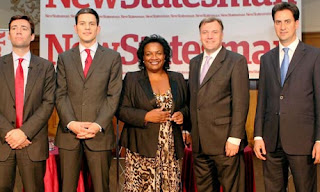Sunday 26th September, 19:00-21:00, Friends Meeting House
In a fringe event organised by the Labour Representation Committee, Tony Benn heralded Ed Miliband’s leadership victory as symbolising a “radical change in people’s attitude to politics” whilst John McDonnell MP warned that “New Labour hasn’t disappeared, it’s gone underground”.
There is a palpable sense of optimism on the left of the Labour Party, but this is tempered with exasperation at the lack of internal democracy. National Executive Committee member Christine Shawcroft described party structures as a “weapon used against its members” whilst Jeremy Corbyn MP attacked the “grossly unfair” way in which the party chooses its leader. Many on the left clearly feel disenfranchised following McDonnell’s failure to get on the leadership ballot and there is a growing thirst for a return to one member one vote selection. Furthermore, there is a real appetite for restoring democracy to conference, Constituency Labour Parties and the Parliamentary Labour Party.
The overriding message of the LRC was unequivocal – public cuts are unnecessary and will attack the poorest and most vulnerable in society. McDonnell championed resistance in partnership with the trade union movement and applauded their experience of organising and campaigning. He emphasised the need to promote realistic alternatives to ConDem cuts – such as the Robin Hood Tax or a Land Evaluation Tax. As McDonnell said:
In a fringe event organised by the Labour Representation Committee, Tony Benn heralded Ed Miliband’s leadership victory as symbolising a “radical change in people’s attitude to politics” whilst John McDonnell MP warned that “New Labour hasn’t disappeared, it’s gone underground”.
There is a palpable sense of optimism on the left of the Labour Party, but this is tempered with exasperation at the lack of internal democracy. National Executive Committee member Christine Shawcroft described party structures as a “weapon used against its members” whilst Jeremy Corbyn MP attacked the “grossly unfair” way in which the party chooses its leader. Many on the left clearly feel disenfranchised following McDonnell’s failure to get on the leadership ballot and there is a growing thirst for a return to one member one vote selection. Furthermore, there is a real appetite for restoring democracy to conference, Constituency Labour Parties and the Parliamentary Labour Party.
The overriding message of the LRC was unequivocal – public cuts are unnecessary and will attack the poorest and most vulnerable in society. McDonnell championed resistance in partnership with the trade union movement and applauded their experience of organising and campaigning. He emphasised the need to promote realistic alternatives to ConDem cuts – such as the Robin Hood Tax or a Land Evaluation Tax. As McDonnell said:
Ed Miliband’s election is a golden opportunity for the left to get socialist ideas across... for the Labour Party to get elected at the next election they need to promote an alternative to government and that means opposing cuts.
The left therefore needs a robust and coherent programme to promote socialist policies. McDonnell highlighted the need to train a new generation of left-wing activists and “repopulate local government with socialist candidates”. Furthermore, the left needs to work closely with left-wing think-tanks such as Compass whilst also developing an independent socialist think-tank to produce policy recommendations and intellectual analysis. McDonnell cited the Left Economics Advisory Panel as an embryonic incarnation of a socialist think-tank.
Beyond this, the left needs to find new and innovative ways to publicise its arguments, campaigns and suggestions. McDonnell decried that the left couldn’t get an article in the Guardian even if they “kidnapped the editor and nailed his scrotum to the desk” and called for a left media network to promote an alternative vision.
Much of the rhetoric and arguments employed by the LRC are familiar, but McDonnell’s call for a socialist think-tank and a non-sectarian left media strategy represent a real and refreshing attempt to reinvent socialism for the 21st century. The left needs to look at how the recession has changed from being a critique of capitalism to a critique of public expenditure – but it will only succeed if it is intellectually robust and able to publicise its message.
Beyond this, the left needs to find new and innovative ways to publicise its arguments, campaigns and suggestions. McDonnell decried that the left couldn’t get an article in the Guardian even if they “kidnapped the editor and nailed his scrotum to the desk” and called for a left media network to promote an alternative vision.
Much of the rhetoric and arguments employed by the LRC are familiar, but McDonnell’s call for a socialist think-tank and a non-sectarian left media strategy represent a real and refreshing attempt to reinvent socialism for the 21st century. The left needs to look at how the recession has changed from being a critique of capitalism to a critique of public expenditure – but it will only succeed if it is intellectually robust and able to publicise its message.











